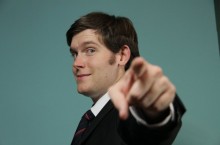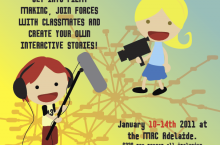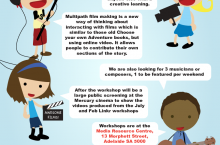Films on the Fly’s Aims and Principles
Defining a companies aims and goals are never easy. The wrong goals can have disastrous effects. As Dan Pink writes in his book Drive, Goals should came with a warning label. “Goals may cause systematic problems for organisations due to norrow focus, unethical behavior, increased risk taking, decreased cooperation, and decreased intrinsic motivation. Use care when applying goals in your organisation.
For those not aware of Dan’s work, check out his TED talk on the Surprising Science of Motivation, an amazing talk which brings home what the likes of Google’s 20% time, and Netflix’s presentation on their Corporate Culture are about. Intrinsic Motivation.
The founders of Films on the Fly, John, Michael and Sunny all want to make the world a better place and hope to work with people who share our passion. We also believe that engaging, interactive video can be used as a catalyst for social change. What better way to change the world than by creating a platform which can be such a catalyst.
To better explain our ideas we have created some company aims and principles.
Films on the Fly‘s main aims and principles are :
- To promote and excel at Multipath storytelling and interactive video.
- To grow South Australia into a world renowned hub for interactive and online video.
- To use our skills, power and wealth for the benefit of the local and broader society and environment.
- To use science and technology to increase our understanding of what we do and help devise ways to do it more efficiently and effectively.
- To foster an environment of innovation and creativity, both inside and outside of the company.
- To, whenever possible, try and fix the root cause of problems, instead of just treating the symptoms.
Films on the Fly sees itself as a ‘for-benefit’ company where the profit-maximisation principal has been augmented with the social-benefit principle. Similar to the idea of an L3C (low-profit limited liability) company, we favour long-term value and social impact instead of short-term economic gain. We aren’t adverse to making money, but we want to make sure that cutting corners now won’t cause catastrophic issues in the future. Examples of companies who have done this include Enron and their accounting practices, Ford creating the health hazard known as the Pinto, and Sears car repair staff trying to meet sales quota’s, so doing unnecessary repair work, ultimately undermining customer relations and long term profits.
One way of putting these concepts into practice is to adjust the way we value things.
In the current monetary system products and services are generally valued according to the scarcity (supply/demand), and human labour required to create it, with a single focus on maximising profits. This was fine 150 years ago when energy was mostly derived from slavery instead of oil and we didn’t have the power of the Internet to expose companies rights and wrongs on such a large scale. When considering the costs of a product or service Films on the Fly likes to include the costs of human well-being and the environment into the equation. For example, whilst the monetary system may value the costs of outsourced child labour very low, because of the damage to human well being we see it as a being more expensive than a normally paid adult worker in Australia. Although if possible we prefer to replace monotonous, repetitive tasks with automated systems or change the design so it does not require such a boring job in the first place.
The cost of a coal fired powerplant might be cheaper in the short term in the current monetary system, but in the long term the smoke and increased environmental destruction is simply not worth it when clean, renewable energy sources like solar and wind are available.
Also, coming from Adelaide we prefer to increase the size of the pie rather than our percentage of it. It is better to be best company in a $500 million industry, than the only company in a $10,000 industry.
The interesting bit for our financing team will be trying to run an internal for-benefit economic model within the current monetary system. It will take some time to find out the true costs of products and services and we will likely try out various algorithms and weightings, but we hope that other companies will follow our lead and choose the smarter long term choices, which ultimately lead to greater profitability for everyone.
If you have any ideas or suggestions regarding this, please comment below or email contact@filmsonthefly.com











